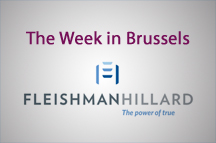 Autumn finally hit Brussels this week, but the cool weather wasn’t the only change around town.
Autumn finally hit Brussels this week, but the cool weather wasn’t the only change around town.
As President Juncker and the new college of commissioners settled into their offices and began their term on November 1st, another, more subtle, changing of the guard also quietly took place. So quietly, in fact, that many people missed it.
Shifts in balance of power within the Council
On the 1st November, a new set of rules came into effect which have subtly shifted the balance of power in the EU towards the larger member states, namely Germany, the UK, France and Italy. In accordance with the 2007 Lisbon treaty, voting in the European Council will now be weighted by population size. Whilst to many outside the ‘Eurobubble’ this is just another technical rule change that adds to the weighty bureaucracy of Council, the practical implication of these rules is significant.
 Under these changes, the influence of the ‘Big 4’ - Germany, the UK, France and Italy - will increase substantially. In the case of Germany, their voting influence will nearly double, and the UK almost the same. Whilst the influence of medium-sized and smaller members, ranging from the Czech Republic and Belgium, to Malta and Luxembourg, will significantly deteriorate, as voting influence will nearly halve in many cases, and for the smaller states, more than halve.
Under these changes, the influence of the ‘Big 4’ - Germany, the UK, France and Italy - will increase substantially. In the case of Germany, their voting influence will nearly double, and the UK almost the same. Whilst the influence of medium-sized and smaller members, ranging from the Czech Republic and Belgium, to Malta and Luxembourg, will significantly deteriorate, as voting influence will nearly halve in many cases, and for the smaller states, more than halve.
What this means in the course of the coming term is a significant shift in political dynamics and balance of power. Although the consensus approach within Council that underpins all decisions and guides negotiations still holds firm, when it comes to negotiation rounds, Germany now needs the UK more than ever. France and Italy can still rely on the ‘Mediterranean bloc’ to negotiate proposals through, but under these rules, Germany will need to look increasingly to the UK for support, as its alliances with other states reduce in potency.
Whilst in the short term, these changes may take a while to come into full force - any country can still request to hold a vote under the old rules until March 2017- a small crumb of comfort designed to ease the pain for those countries losing out, make no mistake, these changes will make the relationships between the ‘Big 4’ more vital than ever, and the tender alliance between the UK and Germany more necessary than ever before.
Changes to how the Commission communicates
 Meanwhile, another shift in the balance of power also quietly took place on Saturday, with changes to the way the Commission communicates with the media and the EU public. The President’s office has cut the number of Commission spokespeople, and the Commissioners themselves will now be the ones to front the press directly. Whilst these changes are intended to increase transparency and levels of communication between the Commission, the press and the EU public, the change also represents a shift in power to President’s Juncker’s office.
Meanwhile, another shift in the balance of power also quietly took place on Saturday, with changes to the way the Commission communicates with the media and the EU public. The President’s office has cut the number of Commission spokespeople, and the Commissioners themselves will now be the ones to front the press directly. Whilst these changes are intended to increase transparency and levels of communication between the Commission, the press and the EU public, the change also represents a shift in power to President’s Juncker’s office.
Remaining spokespeople will now be responsible for communicating the broader views of the Commission, under the direction of the President’s office, and individual Commissioners will no longer have a direct line between themselves and the press, leading many to speculate on a tighter line of control between President Juncker’s office and the Commissioners.
So as Brussels settles into the new term, and the leaves finally start to turn, subtle shifts in power have already begun to shape the dynamics of next commission.












